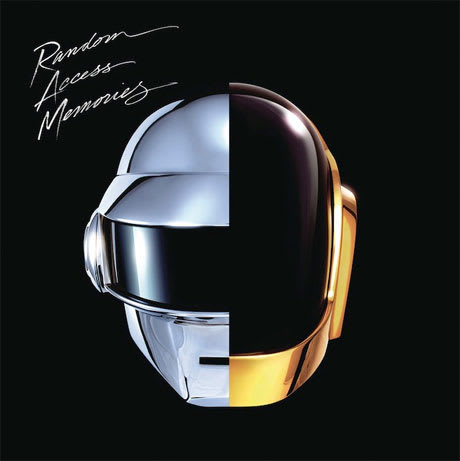The disco blueprint laid out by "Get Lucky" begins on album opener (and mission statement) "Give Life Back to Music," on which Nile Rodgers lays down his trademark wah-wah guitars while the robots command the listener to "let the music make it right." From there, Random Access Memories is a thrilling, grandiose album that defies expectations. Recorded entirely on analog gear, Daft Punk's fourth studio album finds Thomas Bangalter and Guy-Manuel de Homem-Christo revelling in the potential of big budget studios, enlisting a host of high-profile guests to contribute to a process that, until now, had been almost entirely between just the two of them.
Despite an esteemed guest list, it's not the contributions that stand out, but the way the robots employ them. Gentle highlight "Within" features pianist Chilly Gonzalez at his heartstring-tugging best, but it's the deft Daft Punk touch — tinkling chimes and heavily filtered, woozy vocals that sound as if they're melting when they coo, "there are so many things that I don't understand" — that makes the track one of the most affecting they've ever composed. Elsewhere, they coax the best out of the misfiring Julian Casablancas, whose angelic falsetto sounds unlike anything he's done with the Strokes, while Panda Bear's straight-time, harmonized melody sounds even better frolicking in a bed of layered, vocodered voices.
Though it's breathtaking throughout, Random Access Memories is punctuated by dual climaxes, the first of which is "Giorgio by Moroder," whose throbbing, Moroder-esque Moog part and spoken word biography, by its titular collaborator — all twisted in and out of a disco groove that climaxes with a string quartet and a wailing guitar solo — make the nine minute track time fly by. The second is Paul Williams' enchanting contribution, "Touch," on which the enigmatic songwriter waxes theatrical about the power of human connection over eight minutes that shift from heartfelt ballad to Shaft-ish guitar picking, string sections, horn melodies, honky-tonk piano, and of course, disco, before an epic climax, à la "A Day in the Life," leads to a moving choral denouement.
Lyrics in that song claiming it took a touch to "convince me I'm real" could be Random Access Memories' maxim — this is the album on which Daft Punk are truly and convincingly "human after all." And on this toweringly grand achievement, they've never sounded better.
To listen to the album now, head to iTunes here.
(Columbia)Despite an esteemed guest list, it's not the contributions that stand out, but the way the robots employ them. Gentle highlight "Within" features pianist Chilly Gonzalez at his heartstring-tugging best, but it's the deft Daft Punk touch — tinkling chimes and heavily filtered, woozy vocals that sound as if they're melting when they coo, "there are so many things that I don't understand" — that makes the track one of the most affecting they've ever composed. Elsewhere, they coax the best out of the misfiring Julian Casablancas, whose angelic falsetto sounds unlike anything he's done with the Strokes, while Panda Bear's straight-time, harmonized melody sounds even better frolicking in a bed of layered, vocodered voices.
Though it's breathtaking throughout, Random Access Memories is punctuated by dual climaxes, the first of which is "Giorgio by Moroder," whose throbbing, Moroder-esque Moog part and spoken word biography, by its titular collaborator — all twisted in and out of a disco groove that climaxes with a string quartet and a wailing guitar solo — make the nine minute track time fly by. The second is Paul Williams' enchanting contribution, "Touch," on which the enigmatic songwriter waxes theatrical about the power of human connection over eight minutes that shift from heartfelt ballad to Shaft-ish guitar picking, string sections, horn melodies, honky-tonk piano, and of course, disco, before an epic climax, à la "A Day in the Life," leads to a moving choral denouement.
Lyrics in that song claiming it took a touch to "convince me I'm real" could be Random Access Memories' maxim — this is the album on which Daft Punk are truly and convincingly "human after all." And on this toweringly grand achievement, they've never sounded better.
To listen to the album now, head to iTunes here.
